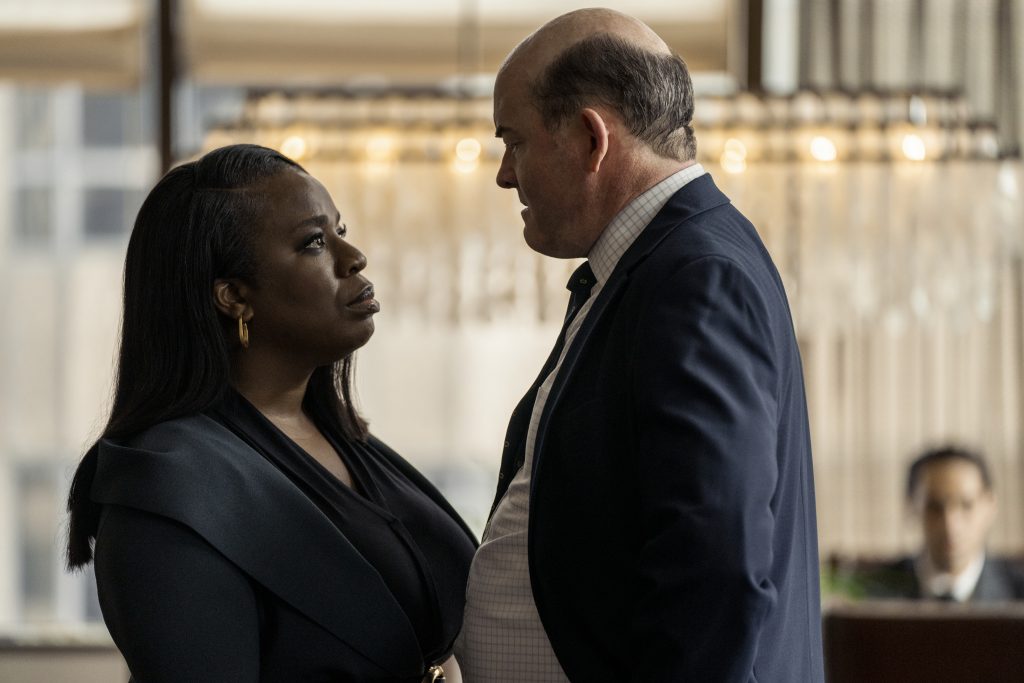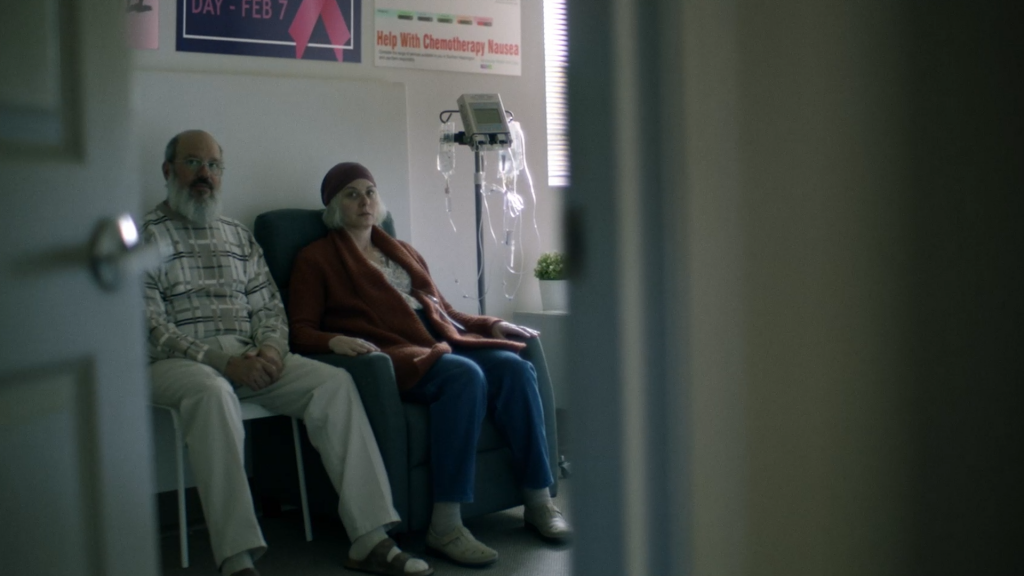December 9, 2021
by Carla Hay

Directed by Ric Roman Waugh
Culture Representation: Taking place during three days in New Orleans, the dramatic film “National Champions” features a cast of African American and white characters representing the working-class, middle-class and wealthy.
Culture Clash: Two football players for the fictional Missouri Wolves college team launch a boycott, right before a national championship game, in protest of the National Collegiate Athletic Association (NCAA) policy that NCAA student athletes are not entitled to salaries, disability pensions and health insurance for playing in NCAA games.
Culture Audience: “National Champions” will appeal primarily to people who are interested in watching well-acted movies about civil rights in athletics and in the workforce.

“National Champions” is a memorable sports movie where all the action and battles take place outside of the game. This tension-filled drama about a college student-athlete boycott features standout performances and a diverse look at various sides of the debate. How you feel about this movie will probably come down to how you answer these questions: Should student athletes of the National Collegiate Athletic Association (NCAA) get salaries, disability pensions and health insurance? And should NCAA student athletes form their own union?
Those questions are at the heart of the issues that are contentiously argued about in “National Champions,” directed by Ric Roman Waugh and written by Adam Mervis. Although the story is fictional, it takes a realistic-looking “what if” approach in depicting what would happen if NCAA football players decided to boycott playing in games, in order to get the NCAA to change its longstanding policies over these issues. And what if that boycott was staged just three days before a national championship game?
Those are the high-pressure circumstances under which the movie opens. “National Champions” does not let audiences go from its tightly wound grip during this entire movie, which is a suspense-filled ride from beginning to end. Even though this is a fictional story where the outcome can easily be predicted, the movie’s intention is to draw attention to the issues that are intensely debated in the movie. People who are not aware of these issues before seeing “National Champions” probably won’t look at NCAA sports in the same way again after seeing this movie.
At the beginning of “National Champions,” which takes place entirely in New Orleans, NCAA football player LeMarcus James (played by Stephan James) is seen at 6:10 a.m. on the balcony of his hotel room, as he gears up for the biggest fight of his life. He’s about to hold a press conference announcing the boycott and the list of demands that he and his fellow boycotters want to be fulfilled by the NCAA, in order to end the boycott. The national championship game is being held in New Orleans, and LeMarcus is expected to be a star of the game.
LeMarcus, who is 21, is the current quarterback for the fictional Missouri Wolves. He recently won the Heisman Trophy. And he is widely predicted to be the first overall pick of the next National Football League (NFL) draft. LeMarcus is well-aware that by launching ths boycott, it will likely ruin his chances to play in the NFL, since he will be branded as a “troublemaker.” However, he is determined to fight for what he strongly believes in, no matter that the consequences.
LeMarcus knows he’s facing an uphill battle in this boycott. At this point in time, LeMarcus and his best friend Emmett Sunday (played by Alexander Ludwig), who is also a Missouri Wolves teammate, are the only two athletes who are solidly committed to this boycott. They both come from working-class backgrounds and have gotten full athletic scholarships to attend their university because of football.
While in New Orleans for the natonial championship game, LeMarcus and Emmett have planned to “go missing” from practice. They move around from hotel to hotel, so that they can’t easily be found. During the course of the movie, they only allow a select number of trusted people into their hotel room. LeMarcus is also battling a nasty cold, but it doesn’t deter his inner strength to fight for his cause. LeMarcus and Emmett are starting this boycott without any help from attorneys.
Emmett, who is the more laid-back of the two friends, doesn’t seem to like public speaking because he’s not seen in the movie making speeches or doing press conferences. Emmett is happy to let LeMarcus take the lead as the spokesperson for the boycott and as the one who articulates the demands that they want the NCAA to follow. Throughout the movie, Stephan James gives an effective performance that shows how LeMarcus has a powerful talent of persuasion and a steely determination to not give up in the face of several obstacles. LeMarcus’ stubbornness and refusal to compromise make him a formidable but very underdog opponent.
LeMarcus has his share of skeptics and naysayers. Before the press conference, a teammate named Orlando Bishop (played by Julian Horton) tries to discourage LeMarcus from going through with the boycott. Orlando tells LeMarcus that the NCAA system won’t change just because LeMarcus doesn’t play in the national championships. “Aint nobody marching in the streets for the number-one anchor. You’re going to embarrass yourself, bro,” Orlando comments. When the boycott is underway, someone else warns LeMarcus that LeMarcus is going to be blacklisted from professional football, just like former NFL star Colin Kaepernick, who is outspoken in his support of the Black Lives Matter movement.
During the brief televised press conference, LeMarcus gives the list of demands that the boycotters want from the NCAA:
- (1) NCAA will create of a non-revokable trust fund for every Division 1 varsity athlete.
- (2) NCAA will contribute to a disability penision for Division 1 athletes who are injured in college athletics
- (3) NCAA will recognize and collectively bargain with the proposed NCAA players’ union, submitting to all federally mandated guidelines of a unionized workforce.
LeMarcus doesn’t sugarcoat what he thinks is going on with the NCAA having a policy forbidding NCAA athletes from being paid athletes: He calls it “slave labor,” where the athletes work for free and other people get rich off of them. “Slave labor” is a hot-button phrase, because it can’t be ignored that most of the NCAA football players are African American, while most of the NCAA officials who are millionaires because of their NCAA salaries are white.
The NCAA doesn’t pay NCAA athletes because of a policy that refuses to classify NCAA athletes as NCAA employees. The NCAA makes a bulk of its profits from licensing its games to television, as well as from collecting money from sponsors that pay the NCAA and individual teams for NCAA athletes to wear sponsor items or use sponsor equipment for free advertising. People who don’t want the NCAA to pay its athletes say it’s because NCAA athletes are college students, not working professionals, and if these athletes got paid, they’d be more likely to be corrupted and drop out of college to spend the money.
During the press conference, LeMarcus gives a damning example of the disparity between how the athletes are not compensated for their work and how the NCAA officials are being highly compensated. He mentions how the unpaid NCAA athletes have to pay for their own medical bills if they are injured during games, while high-ranking NCAA officials each get millions of dollars in salaries and employee perks, such as health insurance benefits, life insurance benefits and lucrative pensions. The billions of dollars that flow through the NCAA, after expenses are paid, end up mostly with an elite group at the top.
To make his point, LeMarcus names the multimillion-dollar annual salaries of some high-ranking NCAA officials, including the salary of Missouri Wolves head coach James Lazor, who is not happy about having his salary being revealed for the whole world to know. By contrast, many NCAA athletes spend so much required time on their sport (which is usually more than a regular 40-hour work week) in additon to their academic requirements, they don’t have time to get salaried jobs, and many of them are financially struggling. NCAA athletes are not allowed to accept high-priced gifts and donations. However, in July 2021 (after “National Champions” was filmed), the U.S. Supreme Court lifted a monetary limit that the NCAA wanted to keep on student-athletes getting education-related gifts and benefits.
The fact that many NCAA athletes get their college tuition and living expenses paid for through scholarships (which usually comes from the athlete student’s college/university, not the NCAA) is of little comfort if it comes at a price of being injured from NCAA games or NCAA training, and the NCAA won’t help with health insurance or medical bills for the injuries. And if athletes in the NCAA have career-ending injuries, or if the athletes don’t make it to the professional leagues, then they are often stuck with paying for medical bills for injuries that they got while playing for the NCAA.
By the time athletes make it into the NCAA, they’re already at least 18 years old, in most cases. And because almost all NCAA athletes are legal adults and working full-time hours for the NCAA, many people believe that NCAA should be compensated like full-time employees. However, too many people are invested in keeping the status quo because they don’t want to share the NCAA’s wealth with the athletes.
These are harsh realities that many people don’t want to think about when they root for their favorite American college teams and athletes. However, as depicted in “National Champions,” people who believe in a boycott of the NCAA until things change in favor of athletes’ civil rights think that the only ways that these changes happen are if the public puts pressure on the NCAA and if activists play hardball with the NCAA. LeMarcus knows that he will probably ruin his promising football career with this boycott, and changes might not come in his lifetime, but he wants to get the ball rolling.
At first glance, it might seem that the plan to launch this boycott is poorly conceived, since only LeMarcus and Emmett seem to the only athletes who are part of the boycott. But the plan, although very risky, is actually a bold strategic move. And that’s because LeMarcus and Emmett plan to use the media to get the word out quickly to a massive audience and gain as much public support as possible.
If LeMarcus and Emmett had secretly tried to recruit other athletes for weeks behind the scenes, the word would’ve gotten out to the people who would want to stop the boycott. By staging the boycott right before the national championship game (the most lucrative football game for the NCAA), it would catch the NCAA off guard and force them to make a decision, or else possibly have the game cancelled. And because of the media attention, the NCAA has to make its decision publicly. LeMarcus and Emmett are fully prepared not to play in the game, but what other NCAA football players will join them?
The media blitz part of the plan works, because the boycott becomes big news. And there are some star NFL athletes who voice their support of the boycott, including Russell Wilson and Malcolm Jenkins, who portray themselves in cameos in the movie. These celebrity endorsements convince some other NCAA national championship football players to join the boycott too. The movie has a scene where LeMarcus gives a passionate speech in a hotel room that further convinces some of his fellow NCAA football players to join the boycott.
It isn’t long before so many Wolves team members are boycotting the game, the team is in danger of having mostly inexperienced freshman left as available team members. An emergency meeting takes place with the key players who will put up the fight in trying to squash the boycott. The people in this meeting are:
- Coach James Lazor (played by J.K. Simmons), the hard-driving leader of the Missouri Wolves, who sees his athletes as his surrogate sons.
- Richard Everly (played by David Koechner), the arrogant, sexist and crude leader of the powerful Southeastern Conference (SEC).
- Wes Martin (played by Tony Winters), a Big 12 Conference executive who has some sympathy for the boycotting athletes.
- Kevin McDonald (played by David Maldonado), director of communications for College Football Playoff (CFP), who is loyal to his employer and has to run interference with the media.
- Mike Titus (played by Jeffrey Donovan), senior vice-president of championships for Division 1 NCAA Football, who is calm and level-headed.
- Katherine Poe (played by Uzo Aduba), who describes herself as “outside counsel,” and seems to have a specialty in crisis management.
In this initial meeting, the men do almost all of the talking, while Katherine mostly sits quietly and listens in the background. But as time goes on, Katherine proves to be a fierce competitor in this boycott war. And she’s willing to do what it takes to win, including digging up some of LeMarcus’ secrets that could hurt his credibility. Coach Lazor wants the boycott to end, but he’s reluctant to play dirty in ways that could ruin LeMarcus’ life and reputation.
In a cast of very talented actors, Aduba and Simmons give outstanding performances not only because their characters are so strong-willed and outspoken but also because Coach Lazor and Katherine have their own unique charisma and flaws. Aduba and Simmons give two of the best monologues in the movie. The screenwriting for “National Champions” is mostly solid, and these cast members definitely elevate the material.
Coach Lazor’s big moment comes when he assembles the remaining Wolves team members in a hotel conference room and gives a rousing and emotional speech about how money doesn’t make someone happy and that he’s not a coach for the NCAA because of the money. He shares a story about his personal background and how his dreams to become professional football player were dashed, but he found a way to channel his passion for football by coaching. Coach Lazor says that money shouldn’t be these athletes’ motivation, but glory should be the main motivation.
Katherine’s impactful monlogue comes in a scene when Emmett accuses her of being heartless. It’s in this scene where Katherine, who comes across as obsessed with her job and somewhat mysterious up until this point, unleashes a tirade to show her human vulnerabilities and emotional pain. She also reveals that she’s not siding with the NCAA because it’s her job, but also because she truly believes that the boycott will hurt NCAA funding for lower-profile sports that don’t get as much attention as football and men’s basketball.
Katherine is probably the most interesting and complex character in this movie. There are many sports movies that show clashes between athletes and authority figures. However, almost all of these movies are about ego conflicts between men. Katherine embodies every woman who’s in a male-dominated job who is constantly underestimated because of her gender. She also happens to be African American, which is adds another layer of discrimination that she no doubt has experienced for her entire life.
It’s this type of life experience that makes her more clear-eyed and prepared for the times when people’s worst natures come out, compared to people who are unprepared and gullible because they go through life never having to experience real discrimination or hatred. Katherine’s way of dealing with opposition can be too extreme, by a lot of standards. She wants to win at all costs, even if she gives up a lot of compassion or empathy that she might have.
“National Champions” is at its best when it focuses on the characters of LeMarcus, Coach Lazor and Katherine. The movie tends to falter when it goes off on other tangents. There’s a soap opera-like subplot about Coach Lazor’s philandering wife Bailey Lazor (played by Kristin Chenoweth) and her lover Elliott Schmidt (played by Timothy Olyphant), a college professor who decides that he’s going to take a job in Italy. The movie shows if Bailey decides to run off with Elliott or not, in the midst of this boycott crisis.
Meanwhile, some supporting characters are introduced in the movie, but their character development is non-existent. Lil Rel Howery portrays Ronnie Dunn, the Wolves’ defensive coordinator coach, who might have to step in for Coach Lazor during the championship game when Coach Lazor seems to be on the verge of having a personal meltdown. Tim Blake Nelson is Rodger Cummings, the head of the Missouri Wolves boosters club, who is not about to let all the booster donations that were poured into the team possibly go down the drain with a boycott that could cost the Wolves the championship game. Andrew Bachelor portrays Taylor Jackson, another wealthy booster of the Wolves.
All the other football players depicted in the movie aren’t given enough screen time for viewers to see if they have distinctive personalities. Cecil Burgess (played by Therry Edouard), who has the nickname the Haitian Hammer, is another star athlete for the Missouri Wolves. However, Cecil only has a few brief scenes, mainly to show that he’s staying loyal to the NCAA, and he thinks the boycott is a mistake. Emmett is portrayed as a nice guy, but his personality is fairly bland.
Despite some of the flaws in the “National Champions” screenplay, the movie is directed, filmed and edited in a way that makes this an engaging thriller for people who want to watch movies about the business side of sports. “National Champions” might disappoint people who think they’re going to see a lot of football playing in the movie. But for other people who appreciate what the film is actually about, they’ll understand that it’s about real-life stakes that are much higher than a championship game.
STX will release “National Champions” in U.S. cinemas on December 10, 2021. The movie is set for release on digital and VOD on December 28, 2021.




